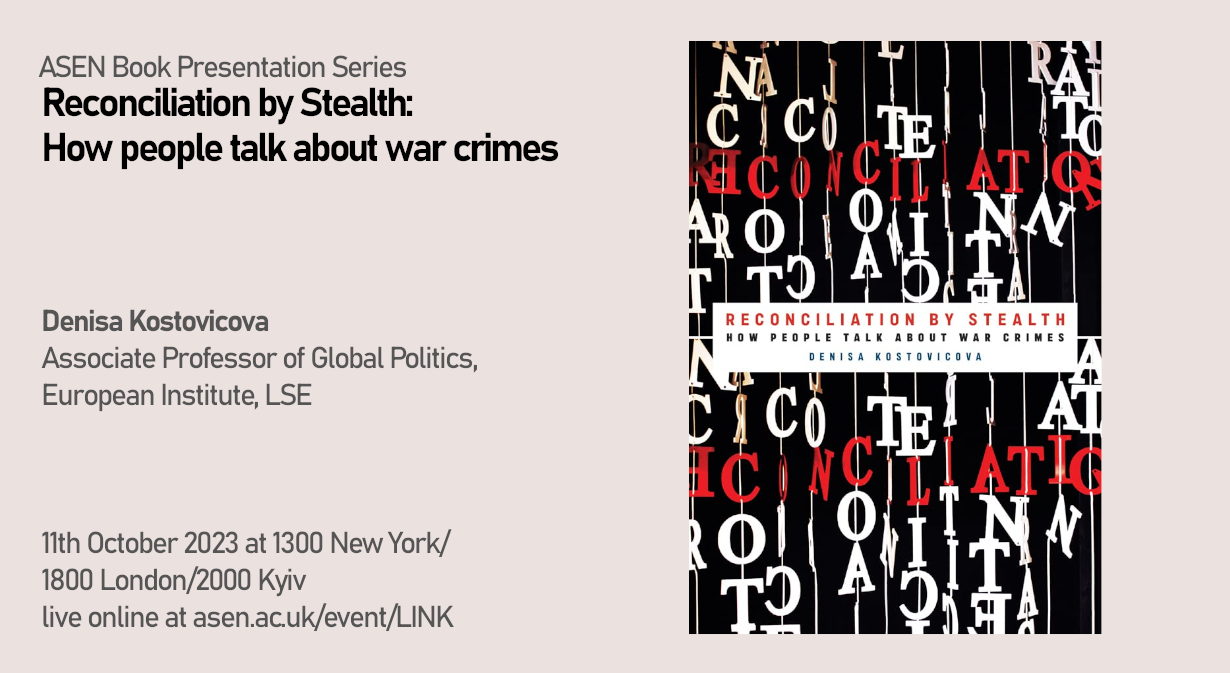Events
Denisa Kostovicova | Reconciliation by Stealth: how people talk about war crimes

Denisa Kostovicova | Reconciliation by Stealth: how people talk about war crimes
We sit down with Prof. Denisa Kostovicova (LSE) to discuss her new book, “Reconciliation by Stealth: how people talk about war crimes”. Join us live on Facebook and YouTube; members will receive an invitation to join the Zoom call.
About Reconciliation by Stealth
Reconciliation by Stealth advances a novel approach to evaluating the effects of transitional justice in postconflict societies. Through her examination of the Balkan conflicts, Denisa Kostovicova asks what happens when former adversaries discuss legacies of violence and atrocity, and whether it is possible to do so without further deepening animosities. Reconciliation by Stealth shifts our attention from what people say about war crimes, to how they deliberate past wrongs.
Bringing together theories of democratic deliberation and peacebuilding, Kostovicova demonstrates how people from opposing ethnic groups reconcile through reasoned, respectful, and empathetic deliberation about a difficult legacy. She finds that expression of ethnic difference plays a role in good-quality deliberation across ethnic lines, while revealed intraethnic divisions help deliberators expand moral horizons previously narrowed by conflict. In the process, people forge bonds of solidarity and offset divisive identity politics that bears upon their deliberations.
Reconciliation by Stealth shows us the importance of theoretical and methodological innovation in capturing how transitional justice can promote reconciliation, and points to the untapped potential of deliberative problem-solving to repair relationships fractured by conflict.
About Denisa
Denisa Kostovicova is Associate Professor in Global Politics at the European Institute, London School of Economics, and is a leading scholar of post-conflict reconstruction with a particular interest in post-conflict justice processes. She is the author of Kosovo: The Politics of Identity and Space (Routledge, 2005) and Reconciliation by Stealth: How People Talk about War Crimes (Cornell University Press, forthcoming), and co-editor of a number edited volumes, including Transnationalism in the Balkans (Routledge, 2008), Persistent State Weakness in the Global Age (Ashgate 2009), Bottom up Politics: An Agency-Centred Approach to Globalisation (Palgrave Macmillan, 2011), Civil Society and Transitions in the Western Balkans (Palgrave Macmillan, 2013), and Rethinking Reconciliation and Transitional Justice After Conflict (Routlege, 2018). Her work, which has also been published in top political science and international relations journals, has informed policy-making at the EU, UN and in the UK. Dr Kostovicova’s research was funded by a number of prestigious grants, including those by the Leverhulme Trust, MacArthur Foundation and Arts and Humanities Research Council (AHRC), among others. She is currently directing a major research programme funded by the European Research Council (ERC) Consolidator Grant, “Justice Interactions and Peacebuilding: From Static to Dynamic Discourses Across National, Ethnic, Gender and Age Groups.” She has a PhD from the University of Cambridge. Prior to joining LSE, she held junior research fellowships at the University of Cambridge and the University of Oxford.
